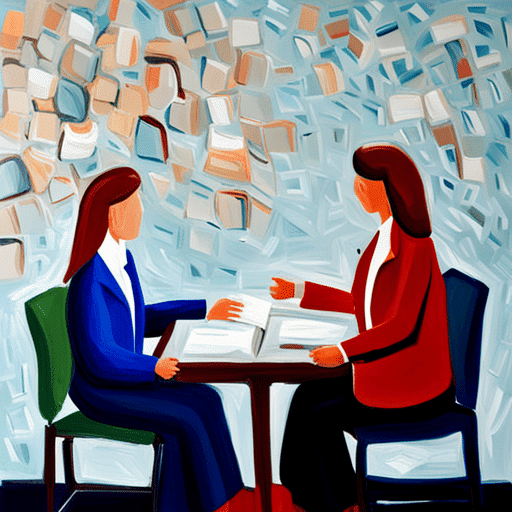This article outlines the common questions and answers during an interview for your Aboriginal Ceremonial Celebrant role. Want to streamline your job hiring/application process? See our job interview, application tracking system and job application tracking templates.
Contents
Example Job Interview Questions For Your Aboriginal Ceremonial Celebrant Role
In this article, we’ll look at the common job interview questions to ask someone applying for your advertised Aboriginal Ceremonial Celebrant role, follow-up questions to ask your potential new hire and excellent answers that candidates give to Aboriginal Ceremonial Celebrant job interview questions. We’ll also look at Aboriginal Ceremonial Celebrant skill requirements, what happens in Aboriginal Ceremonial Celebrant interviews and the hiring process after the interview.
Aboriginal Ceremonial Celebrant Interview Details
Role Description:
An Aboriginal Ceremonial Celebrant is a highly respected and culturally significant role within Indigenous communities. They are responsible for conducting and leading various ceremonies and rituals that are deeply rooted in Aboriginal traditions and customs. These ceremonies can include but are not limited to, weddings, funerals, coming-of-age rituals, and other significant life events. The role requires a deep understanding and respect for Aboriginal culture, as well as the ability to effectively communicate and engage with community members.
Example Job Interview Questions:
1. Can you tell us about your experience and understanding of Aboriginal culture and traditions?
2. How would you approach conducting a traditional Aboriginal wedding ceremony?
3. What steps would you take to ensure cultural sensitivity and respect during a funeral ceremony?
4. How do you handle the responsibility of leading significant life events for community members?
5. Can you share an example of a challenging situation you faced while conducting a ceremony and how you resolved it?
6. How do you ensure inclusivity and engagement of all community members during ceremonies?
7. How do you stay updated on current Aboriginal cultural practices and traditions?
8. Can you describe a time when you had to adapt a ceremony to meet the specific needs or requests of a community member?
9. How do you handle the emotional aspects of conducting ceremonies, particularly during funerals?
10. Can you share an example of a ceremony you conducted that had a profound impact on the community?
Follow-up Questions:
1. How do you handle situations where there may be conflicting opinions or expectations within the community regarding a ceremony?
2. Can you provide examples of how you have collaborated with other community members or organizations to enhance the ceremonial experience?
3. How do you ensure the privacy and confidentiality of community members during ceremonies?
4. Can you describe your approach to mentoring and passing on cultural knowledge to younger generations?
5. How do you handle situations where there may be limited resources or logistical challenges in conducting a ceremony?
Examples of Excellent Answers:
1. “I have been actively involved in my community for over 15 years, participating in various cultural events and ceremonies. I have also undergone extensive training and mentorship from respected elders to deepen my understanding of Aboriginal traditions.”
2. “When conducting a traditional Aboriginal wedding ceremony, I ensure that both the bride and groom are actively involved in the planning process. I also work closely with their families to incorporate any specific cultural elements or rituals they wish to include.”
3. “During funeral ceremonies, I prioritize creating a safe and supportive environment for grieving family members. I offer counseling services and work closely with them to ensure that the ceremony reflects their loved one’s life and honors their cultural beliefs.”
4. “I approach leading significant life events with a deep sense of responsibility and humility. I understand the impact these ceremonies have on individuals and the community as a whole, and I strive to create meaningful and memorable experiences for everyone involved.”
5. “In a challenging situation during a ceremony, I encountered a disagreement between family members regarding the inclusion of certain rituals. I facilitated open and respectful dialogue, allowing each party to express their perspectives. Through compromise and finding common ground, we were able to create a ceremony that honored everyone’s wishes.”
Skills Required:
1. Deep understanding and respect for Aboriginal culture and traditions.
2. Excellent communication and interpersonal skills.
3. Emotional intelligence and the ability to handle sensitive situations with empathy.
4. Strong organizational and time management skills.
5. Flexibility and adaptability to meet the unique needs of each ceremony.
6. Knowledge of local laws and regulations related to conducting ceremonies.
7. Ability to work collaboratively with community members and organizations.
8. Continuous learning and staying updated on cultural practices and traditions.
9. Mentoring and teaching skills to pass on cultural knowledge to younger generations.
10. Strong problem-solving and conflict resolution abilities
Aboriginal Ceremonial Celebrant Interview Schedule
To conduct a comprehensive one-hour interview for a aboriginal ceremonial celebrant role, consider the following schedule:
- Introduction and overview of the role (5 minutes)
- Candidate’s experience and skills assessment (15 minutes)
- Job-specific questions (25 minutes)
- Follow-up questions and clarification (10 minutes)
- Candidate’s questions about the role and organization (5 minutes)
Best Practices for Aboriginal Ceremonial Celebrant Candidate Communication
After the interview for your aboriginal ceremonial celebrant role, it is crucial to keep the candidate informed about the hiring process. Best practices include:
- Sending a personalized thank-you email to the candidate within 24 hours
- Providing a timeline for the hiring process and when they can expect to hear back
- Regularly updating the candidate on their application status, even if there are delays
- Offering constructive feedback to unsuccessful candidates to help them improve for future opportunities
- Maintaining open and transparent communication throughout the entire process to ensure a positive candidate experience

